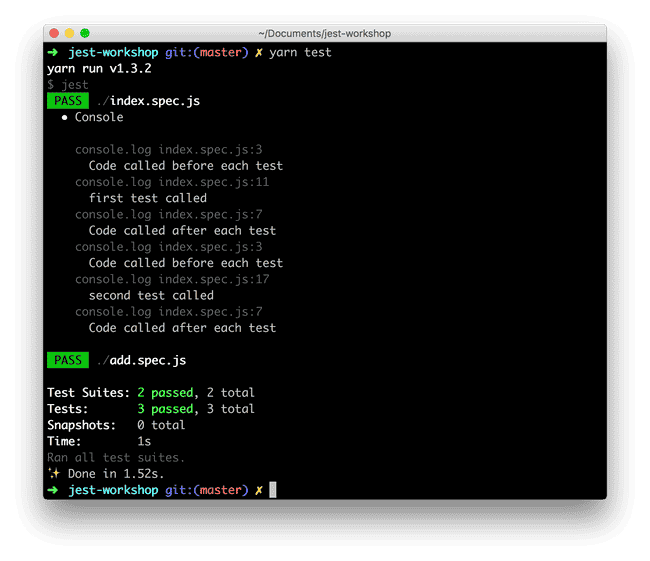Globals
Jest provides global functions that can be called from within your spec files.
For example the describe, it and expect functions within our first tests:
var add = require("./add");
describe("add", function () {
it("adds 2 + 3 to be 5", function () {
expect(add(2, 3)).toBe(5);
});
});Describe
Describe is useful for grouping together functionality that you want to test. For example a particular function, or UI component. These can be nested as many times as needed.
The function accepts two arguments:
describe(name, function);For example:
describe("repository-list", function () {
describe("when there is no data available", function () {
it("renders no rows", function () {
// ...
});
});
describe("when there is data available", function () {
it("renders no rows", function () {
// ...
});
});
});It
All of your test assertions will be placed within an it block:
it(description, function, timeout);For example:
it("returns false", function () {
expect(yourFunction()).toBe(false);
});
it("returns true", function () {
expect(yourOtherFunction()).toBe(true);
});Note that in Jest, it and test are aliases for one another.
Running specific tests
You can focus on particular tests with it.only:
describe("repository-list", function () {
describe.only("when there is no data available", function () {
it.only("renders no rows", function () { // ...
});
});
describe("when there is data available", function () {
it("renders rows", function () {
// ...
});
});
});beforeEach / afterEach
If you want to run a specific block of code before, or after each test:
describe.only("my-library", function () {
beforeEach(function () { console.log("Code called before each test"); }); afterEach(function () { console.log("Code called after each test"); });
it("works when...", function () {
console.log("first test called");
expect(true).toBe(true);
});
it("also works when...", function () {
console.log("second test called");
expect(true).toBe(true);
});
});Example
Matchers
We made use of Jest's expect library to
assert that the result of add(2, 3) was 5. For this scenario we used the .toBe matcher:
expect(add(2, 3)).toBe(5);Out of the box Jest provides lots of useful matchers, and you can even write your own!
Some common matchers that you might use are:
- .toBe(value)
- .toEqual(value)
- .toMatchSnapshot(optionalString)
- .toHaveBeenCalled()
- .toHaveBeenCalledTimes(number)
- .toHaveBeenCalledWith(arg1, arg2, ...)
- .toBeInstanceOf(Class)
- .toContain(item)
- .toThrow(error)
Gotcha!
You may have missed it, but Jest actually provides two ways of asserting equality:
- .toBe(value)
- .toEqual(value)
You should use toBe for matching against primitives, or strict === equality.
expect(result).toBe(primitive);
expect(result).toBe(exactEquality);
expect(result).toBe(1337); // result === 1337
expect(result).toBe(true);
expect(result).toBe(false);
expect(result).toBe("hello world");
expect(result).toBe(result); // result === resultYou should use toEqual for other scenarios, for instance comparing complex objects
expect(result).toEqual(someOtherObject); // result == someOtherObject
// For instance:
expect(result).toEqual({
movies: [
{
title: "The Hitchhiker's Guide to the Galaxy",
releaseYear: 2005,
},
],
});